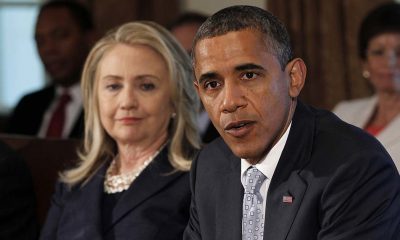World
Ex-Democratic senator Jim Webb announces US presidential candidacy

Washington: Former Virginia senator JimWebb has announced his candidacy for the Democratic Party’s US presidential nomination via email and his Web page.
“I understand the odds, particularly in today’s political climate where fair debate is so often drowned out by huge sums of money,” said the ex-lawmaker who, however, said he had decided to run to try and “unite” the country.
He called in his announcement on Thursday for a “new approach” to solve the biggest problems confronting the nation and a leader who can “shake the hold of (the) shadow elites on our political process”.
Although his name has been mentioned for months as a potential Democratic contender for the party’s presidential nomination, whether or not he would run was not clear until he decided to involve himself despite the strong criticism he had expressed about the campaign financing system and the management of campaigns, Efe news agency reported.
“Our fellow Americans need proven, experienced leadership that can be trusted to move us forward from a new president’s first days in office,” he said in his announcement.
His message, directed mainly to his supporters, emphasised his military experience as a troop commander in the Vietnam War and as assistant defense secretary and secretary of the Navy during the 1981-1989 presidency of Ronald Reagan.
Webb becomes the fifth Democrat to throw his hat into the ring, along with former Maryland governor Martin O’Malley, Vermont Senator Bernie Sanders, former Rhode Island senator Lincoln Chafee and the hot favourite: former secretary of state Hillary Clinton.
In a clear allusion to Clinton’s decisions while she was a senator and head of the State Department, Webb said that he would not have voted to involve the US in war in Iraq if he had been a senator at that time, adding that he would not have used military force in Libya during the Arab Spring.
World
Lockdowns in China Force Urban Communities to Defy Censorship and Vent Frustration Online

Shanghai’s rich middle class is leading a wave of online dissent over the strict and prolonged lockdowns imposed in various parts of the country. Chinese internet censorship is struggling as patience is wearing thin in many urban centers, coming up with creative forms of online protests.
Social Media Posts Revealing Lockdown Tension in Shanghai
Drawn-out lockdowns are nothing new in China as authorities insist with the nation’s zero-Covid policy since the start of the pandemic. Currently over This time around, however, metropolitan areas like Shanghai are increasingly difficult to keep quiet, given that its more than 25 million residents have seen weeks of total isolation along with food shortages and many other service interruptions.
Dozens of towns and reportedly over 300 million Chinese citizens have been affected by lockdowns of different severity. As expected, urban netizens have been most outspoken over their difficulties by finding creative ways to get around state censorship and bans placed on topics, news comments and spontaneous campaigns.
Shanghai residents have been using mobile proxies and hijacking seemingly unrelated hashtags to talk about healthcare issues, delivery failures and the overall severity of their situation. The “positive energy” that the Chinese government wants to transmit during the recent prolonged series of lockdowns does not come naturally to those counting food supplies and online censors are working hard to filter words, trending topics and undesired social media sharing.
WeChat groups and message threads are under constant monitoring. Posts questioning the zero-Covid approach have been quickly deleted, including by leading Chinese health experts like Dr. Zhong Nanshan. Video footage is soon censored and protests and investigations are quickly made to disappear.
Where this has not worked, officials have exposed banners with warnings and outright threats like “watch your own mouth or face punishment”, while drones have been patrolling the city skies. Yet, if anything, this has led to further tensions and unspoken confrontation with Shanghai’s educated and affluent middle class.
Creative Online Solutions Harnessing Civic Energy
Announcements by Chinese social media that they would be publishing the IP addresses of users who “spread rumors” have not helped either. Tech industry research has shown that much of Asia’s tech-savvy population has a habit of using mobile proxies and other privacy tools, quickly finding workarounds to browse the internet freely and talk to the world about the hottest topics.
The sheer volume of forbidden posts is already a challenge for the very censorship system, experts explain. Unable to track all trending hashtags, state workers overlook topics that speak about the US, Ukraine or other popular news. Linking human rights elsewhere to their situation, Chinese online dissidents establish their informal channels and “hijack” the conversation to share personal or publicly relevant information about the Covid suppression in their town.
Sarcastic and satirical posts still dominate. Others hope to evade the censors by replacing words from famous poems or the national anthem. One thing is certain – social media, when harnessed with the right creativity, has proven its ability to mount pressure on the government in even some of the most strictly controlled tech environments like China.























